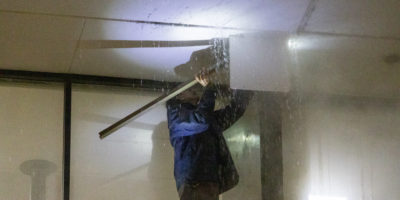By Aidan Macnab
To bring its elections into the electronic age, the incoming RSU executive plans on instituting online voting for next year’s RSU elections.
Many student unions across Canada use online voting in their elections. The University of Toronto student union started offering online voting in 2013. The RSU’s lack of the online option is unique in Ryerson student governing bodies. The board of governors and the senate both offer online voting in their elections.
Cormac McGee was elected to the RSU as vice-president of education, and will also serve on the board of governors. He said online voting is a priority for the new RSU executive.
“That’s definitely something we want,” he said. “That’s going to be one of the first things we look into.”
University students do not typically have a lot of time on their hands, and McGee said that the time it takes to stand in line and cast a paper ballot in person is an unnecessary impediment to the process.
“Lining up for 20 minutes is a real barrier to people,” he said.
Rajean Hoilett, president of the RSU, said that the “unprecedented” voter turnout witnessed in the past RSU elections is evidence that providing the online option is not a necessity for student engagement. After a record-low turnout of five per cent last year, this year’s election — where Hoilett’s Unite slate was swept by McGee’s Transform — saw a 75 per cent spike.
The board of governors had a 5.2 per cent turnout this year. The senate’s was 2.6 percent and the RSU was around eight per cent.
“If we’re talking about student engagement, we see that physical ballots usually have more engagement than online voting,” he said.
Recently elected senator at large, Joshua D’Cruz said he thinks that the amount of campaigning that is done in the RSU election compared with the senate and BOB, is the reason for the disparity in turnout numbers. He said he thinks more options mean higher turnout.
“It should raise the voter turnout because online voting is easier,” he said. D’Cruz also ran unsuccessfully, as an independent candidate, for RSU’s VP of operations.
D’Cruz also pointed out that students at job placements or just not on campus during polling do not have an opportunity to vote. Part-time students, who work during the day and take classes at night, can also miss their shot.
Hoilett said that the idea of instituting online voting “hasn’t been a huge topic,” for the current regime. McGee said that is because not having it benefits the incumbent.
“Historically, when there wasn’t an opposition slate, it was easy just to get your friends to go to the polls for you, if you were running,” McGee said. “It’s a lot easier to lose if there’s online voting. Even people who are lazy are going to vote if you send them a link on Facebook.”
Hoilett said he is not convinced by the argument that only offering physical ballots helps the incumbent and points to his team’s loss as evidence of that.
“This year we saw an election where the incumbent slate did not win the election and it was with physical ballots,” said Hoilett. “We had a pretty significant turnout, so I’m not confident that online voting would change that.”












Leave a Reply